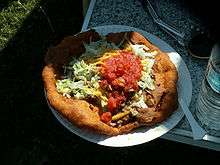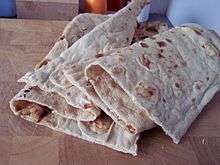Frybread
 | |
| Type | Flatbread |
|---|---|
| Place of origin | United States |
| Main ingredients | Dough, leavening agent, fat (oil, shortening, or lard) |
| Other information | State bread of South Dakota |
|
| |


Frybread (also spelled fry bread) is a flat dough bread, fried or deep-fried in oil, shortening, or lard. Made with simple ingredients, frybread can be eaten alone or with various toppings such as honey, jam, powdered sugar, or hot beef. Frybread can also be made into tacos, like Indian tacos. It is a simple complement to meals.
History
According to Navajo tradition, frybread was created in 1864 using the flour, sugar, salt and lard that was given to them by the United States government when the Navajo, who were living in Arizona, were forced to make the 300-mile journey known as the "Long Walk" and relocate to Bosque Redondo, New Mexico onto land that could not easily support their traditional staples of vegetables and beans.[1]
For many Native Americans, "frybread links generation with generation and also connects the present to the painful narrative of Native American history."[1] It is often served both at home and at gatherings. The way it is served varies from region to region and different tribes have different recipes. It can be found in its many ways at state fairs and pow-wows, but what is served to the paying public may be different from what is served in private homes and in the context of tribal family relations.
Health concerns
The U.S. Department of Agriculture reports that a plate of fried bread consists of 700 calories and 27 grams of fat.[2]
Varieties
A typical frybread recipe consists of flour, water, salt, a small amount of oil, and baking powder. The ingredients are mixed and worked into a simple dough, and covered with a cloth for 30 minutes to an hour, until the dough rises. It is then formed into small balls, and are either rolled or pulled into flat discs prior to frying in hot oil. Many variations of this basic recipe exist, including substituting mayonnaise for oil in the dough (which produces a crisp, crunchy texture that resists getting soggy - ideal for Navajo tacos), and leavening the dough with a small container of yogurt or soured milk instead of using baking powder or yeast (produces a rich, sourdough flavor but requires several hours to fully leaven after the dough is prepared). Most frybread recipes do not use yeast at all because it was not typically available to Native peoples when this foodstuff was developed. In many Native American households, frybread dough is mixed early in the morning and left in a large bowl covered with a cloth to leaven and is used throughout the day to prepare fresh bread when needed.
Other facts
- Frybread was named the official "state bread" of South Dakota in 2005.[3]
- Frybread is also known in South American cooking as a sopaipilla.[4]
- In Hungary (Central Europe), there is a similar food called Lángos.
- In Bulgaria (Eastern Europe), there is a similar food called Mekitsa.
- In Italy there are similar foods called gnocco fritto and pizza fritta, which exists in several regional variants. Some are quite identical to the Native Americans recipe.
- In Trinidad and Tobago it is called Fry Bake and eaten with fried shark, tomato choker or saltfish buljol.
See also
References
- 1 2 Miller, Jen. "Frybread". Smithsonian.com. Retrieved 2012-01-20.
- ↑ "USDA National Nutrient Database for Standard Reference, Release 23" (PDF). USDA.
- ↑ NetState.com. Official State Foods. 2006. February 18, 2007.
- ↑ Glossary, yanuq.com
External links
| Wikibooks Cookbook has a recipe/module on |
 Media related to Frybread at Wikimedia Commons
Media related to Frybread at Wikimedia Commons- Encyclopedia of Oklahoma History and Culture - Fry Bread
- Recipes for frybread by Tribe or Nation
- Navajo Fry Bread History
- Fry Bread Facts
- More Than Frybread Mockumentary
- Fry Bread House Honored Among the Best of the Best — frybread restaurant in Phoenix a winner of 2012 "America's Classics" James Beard Foundation Award.
- Diet or Fry It, Gen Huit, Salish

